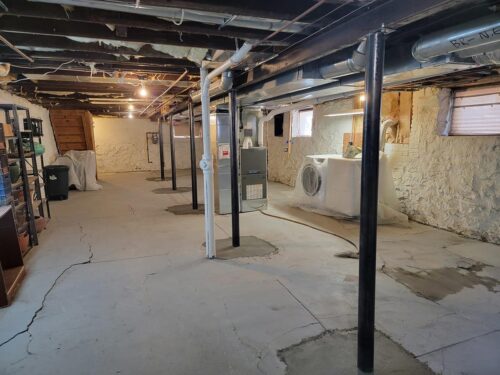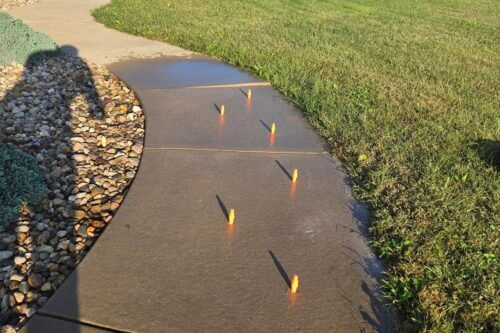
Concrete is one of the most durable building materials, but it still requires regular maintenance to maximize its lifespan. Without proper care, concrete surfaces can crack, settle, or deteriorate due to environmental factors, moisture, and heavy usage. Whether it’s your driveway, sidewalk, foundation, or patio, implementing a preventative concrete maintenance plan can save you from costly repairs in the future.
At Cornerstone Structural Repair & Waterproofing, we help homeowners and businesses in St. Louis protect their concrete investments with expert maintenance and concrete repair services. Our life of structure warranty ensures that our solutions provide long-lasting protection and stability. Contact us to learn more or request a quote for your concrete repair or basement waterproofing needs.
Essential Concrete Maintenance Tips
1. Keep Concrete Clean and Free of Debris
Dirt, leaves, and other debris can trap moisture and promote staining, mold growth, and surface deterioration. Regularly sweeping and washing your concrete surfaces prevents buildup and helps maintain their appearance.
Tip: Use a garden hose and mild detergent or pressure washer to remove dirt and grime without damaging the concrete.
2. Seal Concrete Surfaces
Applying a high-quality concrete sealant helps protect against moisture infiltration, stains, and freeze-thaw damage. Sealing concrete is especially important for outdoor surfaces that are exposed to rain, snow, and road salt.
Tip: Reseal your concrete every 2-3 years or as recommended based on exposure to the elements.
3. Address Cracks and Damage Immediately
Small cracks in concrete can expand over time, leading to more serious structural issues. Prompt repairs prevent moisture from seeping into the cracks and causing further deterioration.
Tip: Use professional concrete crack repair services to ensure a durable fix that prevents future damage.
4. Ensure Proper Drainage Around Concrete
Water is one of the biggest threats to concrete stability. Poor drainage can lead to concrete settlement, erosion, and cracking.
Tip: Keep gutters and downspouts clear, grade your landscape to direct water away from concrete surfaces, and consider basement waterproofing to prevent foundation problems and damage.
5. Avoid Deicing Salts in Winter
While deicing salts help melt ice, they can also cause concrete to deteriorate by increasing moisture absorption and triggering freeze-thaw cycles.
Tip: Use sand or calcium magnesium acetate as a safer alternative to traditional rock salt.
6. Prevent Heavy Loads and Impact Damage
Excessive weight or force can cause concrete to crack or sink over time. Avoid parking heavy vehicles on driveways not designed to support them, and take care when using tools or equipment that could chip the surface.
Tip: If you notice uneven slabs or sinking concrete, concrete leveling can restore stability to sinking driveways or walkways without a full replacement.
7. Control Vegetation Growth
Tree roots and other vegetation can displace soil and cause concrete to shift or crack. Overgrown plants near your driveway, sidewalk, or foundation can lead to long-term damage.
Tip: Plant trees and shrubs away from concrete structures and install root barriers to minimize soil movement.
8. Monitor for Signs of Settlement
Concrete settlement occurs when the soil beneath a slab shifts or compacts unevenly. Signs of settlement include uneven surfaces, large cracks, and pooling water.
Tip: If you notice signs of sinking concrete, mudjacking or polyurethane foam injection can lift and stabilize the affected areas.
9. Maintain Your Foundation
Your home’s foundation directly impacts the integrity of surrounding concrete surfaces. If your foundation is shifting or cracking, it can lead to widespread concrete damage.
Tip: Schedule regular foundation inspections to detect and address problems early.
10. Schedule Professional Concrete Maintenance
While DIY maintenance helps, professional assessments and repairs ensure your concrete remains in excellent condition for years to come. Partnering with experienced specialists can prevent minor issues from becoming major expenses.
Tip: Contact Cornerstone Structural Repair & Waterproofing for expert concrete maintenance solutions in St. Louis.

FAQs About Concrete Maintenance
How often should concrete be sealed?
Sealing concrete every 2-3 years helps maintain its durability and appearance. However, high-traffic areas may require more frequent sealing.
What causes concrete to crack?
Cracks can result from freeze-thaw cycles, moisture infiltration, heavy loads, settlement, or improper installation. Prompt repairs help prevent worsening damage.
Can I pressure wash my concrete surfaces?
Yes, but use a low-pressure setting to avoid damaging the surface. A mild detergent can help remove stains and grime.
How do I know if my concrete needs leveling?
If you notice uneven surfaces, trip hazards, or pooling water, your concrete may need leveling. Mudjacking or polyurethane foam injection are effective solutions.
What is the best way to prevent concrete settlement?
Proper drainage, soil compaction, and regular maintenance help minimize settlement risks. If settlement occurs, professional leveling services can restore stability.
Contact Us for Concrete Maintenance Services in St. Louis
Taking a proactive approach to concrete maintenance can help you avoid costly repairs and extend the life of your concrete surfaces. Whether you need sealing, crack repair, or leveling, Cornerstone Structural Repair & Waterproofing provides expert solutions tailored to your needs. Contact us to schedule your concrete maintenance or repair service in St. Louis.

